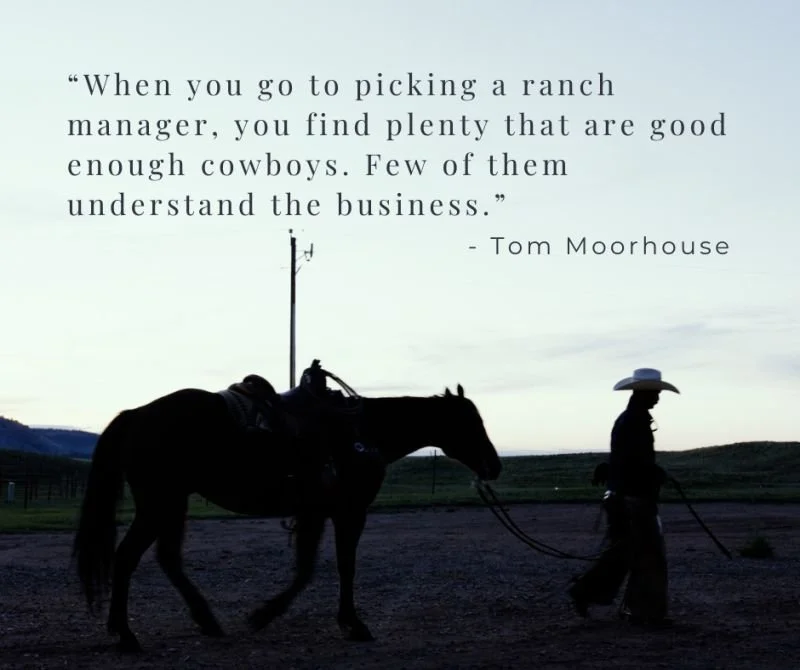Cowboys vs. Ranch Managers: Why Every Great Operation Needs Both
One of the most common mistakes we see in ranch management is the misunderstanding of the difference between a ranch manager and a cowboy.
Plenty of ranch managers are excellent cowboys—but not all cowboys make good ranch managers.
And that’s okay.
It takes all kinds of kinds to run a ranch. A thriving operation needs skilled cowboys and stockmen who understand cattle, land, and weather better than anyone. But it also needs leadership—a manager who can take all that on-the-ground expertise and translate it into a profitable, sustainable business.
That’s where the difference lies: in scope, in mindset, and in responsibility.
The Cowboy: Keeper of the Daily Work
Cowboys are the heartbeat of every working ranch. They handle the details that keep the whole system moving: riding pastures, doctoring calves, fixing fence, and moving cattle with quiet competence and instinct honed over years in the saddle.
A good cowboy reads cattle like a book. He knows when a calf is sick, when a cow’s about to calve, and when the wind’s about to shift. His work ethic keeps the operation running smoothly day to day, and his hands-on care has a direct impact on animal health and well-being.
But the cowboy’s job, by nature, is tactical. It’s about execution and doing things right.
The Ranch Manager: Keeper of the Big Picture
The ranch manager, on the other hand, is responsible for doing the right things.
Many great managers are also excellent cowboys and cattlemen, but their job carries a different kind of weight—the weight of decisions that affect everyone and everything on the ranch. They see beyond the daily work and think in systems, seasons, and years.
They balance cattle performance with forage management, budgets with payroll, and long-term herd genetics with short-term cash flow. They read market reports and pasture conditions. They work cows but also forecast feed prices, evaluate investments, and negotiate contracts.
Cowboys keep the ranch moving; managers keep the ranch viable.
It’s Not a Hierarchy—It’s a Partnership
This isn’t about one role being more important than the other. It’s about understanding that they serve different, equally critical purposes.
Cowboys make good ranch managers only when they develop new skill sets—strategic thinking, communication, leadership, and financial literacy. And great managers never lose respect for the cowboy’s knowledge and craft. When both roles are valued and clearly defined, that’s where the magic happens.
Too often, we see operations fail because the owner assumes that because someone is good with cattle, they’re good with ranches. But that’s often not the case.
The best ranches build teams, not hierarchies. They hire managers who empower good cowboys and create systems that make everyone better at their job.
Bridging the Skills Gap
As the business of ranching gets more complex—volatile markets, rising input costs, shifting regulations—the gap between being a good stockman and a good manager grows wider. It’s no longer enough to know cattle; you have to know commerce.
Modern ranch managers have the skills to take care of cattle and grass, but they also know about:
Merchandising cattle — Knowing when, where, and how to sell for maximum value
Futures and commodities — Understanding risk management and price protection
People management — Building teams, setting expectations, retaining talent
Financial management — Reading financial statements and creating annual budgets
Big-picture planning — Aligning production, grazing, and marketing goals
Logistics and scheduling — Managing complexity with precision
These are not “corporate” skills. They’re essential ranch management skills in 2025.
Respecting Both Crafts
Tom Moorhouse said it beautifully on The Cowboy Life Podcast in a conversation with Ross Hecox:
“A cowboy’s worth is in what he can get done. A manager’s worth is in what he can help others get done.”
That line captures the heart of the issue.
Cowboys prove their value through action; managers prove theirs through leadership. Both require humility, discipline, and pride in a job well done.
At JRC, we’ve seen firsthand how transformational it is when the right manager is in the right seat—with the right cowboys beside him. The whole operation levels up. Productivity improves. People stay longer. The land gets better. And the owner finally gets what they were after all along: a ranch that runs like it should.

